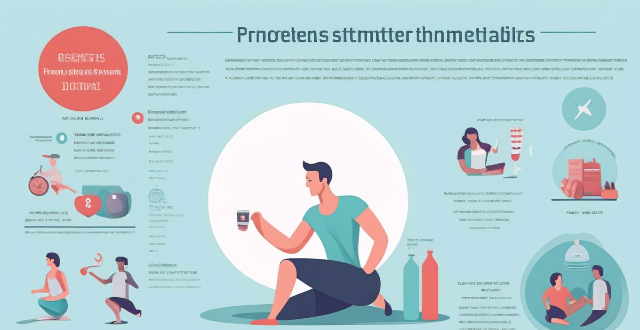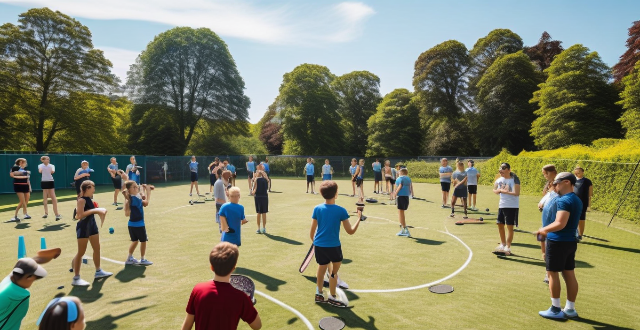Cognitive Stress

How important is sleep for optimizing concentration and cognitive functions ?
The article discusses the significance of sleep for enhancing concentration and cognitive functions. It states that adequate sleep is crucial for improving attention span, alertness, memory consolidation, learning capacity, problem-solving abilities, and decision-making skills. The benefits of getting enough sleep include improved productivity, better performance, reduced stress levels, and enhanced mood. Therefore, prioritizing sleep as part of a healthy lifestyle is essential to optimize concentration and cognitive functions.

How does physical activity affect children's cognitive development ?
This article discusses the positive impacts of physical activity on children's cognitive development, including improved attention and memory, enhanced executive functioning, increased learning abilities, reduced stress and anxiety, and promoted socialization and teamwork skills. Regular exercise can enhance blood flow to the brain, strengthen neural connections in the prefrontal cortex, stimulate neurogenesis, release endorphins, and provide a healthy outlet for releasing energy and emotions. Encouraging children to engage in regular physical activity can have long-lasting positive effects on their overall well-being and success throughout life.

What role does sleep play in managing stress ?
Sleep is crucial in managing stress by regulating hormones, improving cognition, promoting emotional stability, offering physical health benefits, and enhancing quality of life. Prioritizing sleep is key for effective stress management.

Can regular exercise prevent cognitive decline in older adults ?
Regular exercise may help prevent cognitive decline in older adults by promoting neuroplasticity, improving blood flow to the brain, and reducing inflammation. Multiple studies have found positive associations between physical activity and cognitive function in this age group. Guidelines recommend aerobic exercise, resistance training, and activities that improve flexibility and balance. Making exercise a regular part of daily life is key for maintaining cognitive benefits over time.

Is there a relationship between exercise and cognitive function ?
Exercise is a potential intervention for enhancing cognitive function across the lifespan. The relationship between exercise and cognitive function is complex and multifaceted, involving various aspects of cognition and different types of exercise. Long-term exercise interventions have consistently shown positive effects on cognitive function, particularly in older adults. Different types of exercise may influence specific cognitive functions differently, and the underlying mechanisms behind these effects are still being explored. By incorporating regular physical activity into our daily routines, we can potentially enhance our cognitive function and overall well-being.

How does exercise affect brain function and cognitive abilities ?
This article discusses how regular physical activity positively impacts brain function and cognitive abilities by improving blood flow, boosting neurotrophic factors, enhancing plasticity, and reducing inflammation. It emphasizes the importance of incorporating exercise into one's lifestyle for maintaining and enhancing cognitive health.

Can exercise reverse cognitive impairment caused by neurological disorders ?
Exercise may help reverse cognitive impairment caused by neurological disorders. Studies have shown that exercise can improve cognitive function in people with Alzheimer's disease, Parkinson's disease, and stroke. Exercise may also reduce inflammation, improve balance and mobility, and increase overall quality of life for people with neurological disorders. More research is needed to fully understand the effects of exercise on cognitive impairment caused by neurological disorders.

Does exercise have different effects on cognitive function at different ages ?
This article explores the relationship between exercise and cognitive function across various age groups. It highlights the benefits of exercise for children's cognitive development, adults' reduced risk of cognitive decline, and older adults' slowed cognitive decline. Examples of suitable exercises for each age group are provided, including playing sports for children, aerobic activities for adults, and walking or cycling for older adults. The article concludes that incorporating physical activity into daily routines at any age is crucial for maintaining cognitive health and overall well-being.

How can stress management contribute to better personal health ?
Stress management is crucial for maintaining physical and mental health, as it can reduce the risk of chronic diseases, improve sleep quality, boost the immune system, reduce anxiety and depression symptoms, enhance cognitive function, and increase resilience. Incorporating stress management techniques into daily routines can lead to better overall well-being and a higher quality of life.

How does exercise influence neuroplasticity and cognitive function ?
Exercise has a positive impact on neuroplasticity and cognitive function by increasing blood flow, releasing growth factors, reducing inflammation, improving attention and concentration, enhancing memory, and slowing cognitive decline. Incorporating regular physical activity into your lifestyle can have numerous benefits for your brain health and overall well-being.

Is there a specific type of exercise that is most effective for enhancing cognitive abilities ?
Exercise has been shown to have numerous benefits on cognitive abilities, but is there a specific type of exercise that is most effective? Aerobic exercise improves blood flow and reduces stress, while resistance training boosts BDNF levels and enhances executive function. Combination exercises provide a comprehensive workout for the body and brain. Finding an exercise routine that you enjoy and can stick to is key to reaping the cognitive benefits over time.

Does exercise influence emotional regulation and mental well-being, which in turn affects cognitive processes ?
The article explores the relationship between exercise, emotional regulation, mental well-being, and cognitive processes. It suggests that regular physical activity can positively impact emotional regulation by reducing stress levels, improving self-esteem, and providing a healthy outlet for negative emotions. Exercise also contributes to improved mental well-being by alleviating symptoms of depression and anxiety, promoting relaxation, and providing opportunities for social interaction. These factors, in turn, influence cognitive processes such as attention, memory, problem solving, and decision making. Overall, the article concludes that incorporating exercise into daily routines can have numerous benefits for overall health and well-being.

How long after starting an exercise routine can improvements in cognitive function be expected ?
The text discusses the timeline for improvements in cognitive function after starting an exercise routine. It mentions that immediate benefits such as enhanced mood, improved attention and focus, and increased energy levels can be noticed within 1-3 months. Mid-term benefits like enhanced memory retention, improved executive function, and increased creativity can be observed within 3-6 months. Long-term benefits such as slowed cognitive decline, reduced risk of cognitive disorders, and sustained improvements in overall cognitive performance can be achieved after six months or longer. The text emphasizes the importance of maintaining a consistent exercise regimen over the long term for sustained enhancements in various aspects of cognitive function.

What role does physical exercise play in boosting mental focus ?
Physical exercise is not only beneficial for our physical health, but it also plays a crucial role in enhancing mental focus. Here's how: 1. Release of Endorphins: Regular exercise triggers the release of endorphins, which can help reduce stress and anxiety, leading to improved mental clarity and focus. 2. Increased Blood Flow to the Brain: Engaging in physical activities increases blood flow to the brain, delivering more oxygen and nutrients. This increased blood flow can help improve cognitive function, memory, and overall mental sharpness. 3. Better Sleep Quality: Exercise has been shown to promote better sleep quality and duration. Adequate sleep is essential for maintaining mental focus and concentration throughout the day. 4. Reduction of Stress and Anxiety: Physical activity helps lower levels of the body's stress hormones, such as cortisol. By reducing stress and anxiety, exercise allows individuals to maintain a clearer mind and stay focused on tasks at hand. 5. Enhanced Self-Confidence and Mood: Regular exercise can boost self-esteem and confidence, leading to a positive outlook on life. A positive mindset contributes to better mental focus and productivity. 6. Improved Cognitive Function: Studies have found that regular physical exercise can lead to improvements in various aspects of cognitive function, including attention, memory, and executive functions. These cognitive enhancements directly contribute to increased mental focus and concentration.

What role does exercise play in maintaining cognitive function in old age ?
Exercise is crucial for maintaining cognitive function in old age, with benefits including improved blood flow, reduced inflammation, and increased neuroplasticity. Aerobic exercise, resistance training, and activities like yoga and tai chi are all beneficial. Incorporating physical activity into your daily routine can help keep your mind sharp as you age.

Can exercise help with stress management ?
**Topic:** Can Exercise Help with Stress Management? **Summary:** * **Introduction:** The inevitability of stress and its potential impact on health highlight the importance of effective stress management. Exercise is often touted as a beneficial method for reducing stress. * **Relationship Between Exercise and Stress:** * **Physical Effects:** Exercise triggers endorphins, reduces cortisol levels, and improves sleep quality—all of which contribute to stress reduction. * **Mental Effects:** Enhanced cognitive function, increased self-esteem, and mindfulness techniques associated with exercise can aid in stress management. * **Benefits of Exercise for Stress Management:** * **Physical Benefits:** Improved cardiovascular health, weight management, and pain relief can reduce stress caused by related health issues. * **Mental Benefits:** Exercise can alleviate symptoms of anxiety and depression, improve mood, and increase resilience to stress. * **Practical Tips:** * **Setting Goals:** Start small and choose enjoyable activities to make exercise a sustainable habit. * **Consistency:** Scheduling workouts, finding an accountability partner, and tracking progress can help maintain a regular exercise routine. * **Conclusion:** Exercise is a powerful tool for managing stress, offering both physical and mental benefits. Incorporating it into one's lifestyle can significantly enhance overall well-being and resilience to life's challenges.

How does stress management through exercise impact professional well-being ?
The impact of stress management through exercise on professional well-being is significant and positive. Professional well-being refers to overall satisfaction and happiness in the workplace, which includes job satisfaction, work-life balance, relationships with colleagues, and personal growth opportunities. Exercise is a proven method for managing stress, as it releases endorphins and reduces levels of stress hormones like cortisol and adrenaline. Regular physical activity also promotes better sleep, essential for stress management. The impact of exercise on professional well-being includes improved mental health, enhanced cognitive function, increased energy levels, better work-life balance, and improved interpersonal relationships at work. By incorporating regular physical activity into our daily routine, we can achieve these benefits, leading to increased productivity, reduced absenteeism, and improved job performance. Therefore, organizations should promote exercise among their employees as part of their overall wellness program.

Can eating habits affect my level of stress before an exam ?
Eating habits can significantly affect your level of stress before an exam. Proper nutrition is crucial for maintaining physical and mental well-being, which impacts your ability to handle stress and perform well during exams. Here are some ways in which eating habits can influence your stress levels: 1. **Blood Sugar Regulation**: Eating balanced meals and snacks throughout the day helps maintain stable blood sugar levels, avoiding mood swings and irritability that can increase stress. 2. **Brain Function**: Your brain requires essential nutrients to function properly. Foods rich in vitamins, minerals, and antioxidants support cognitive function and improve focus, memory, and concentration. 3. **Gut-Brain Connection**: There is a strong connection between your gut health and your mental state. Eating probiotic-rich foods promotes a healthy gut microbiome associated with better mood and reduced stress. 4. **Hydration**: Staying hydrated is essential for overall well-being and can impact your stress levels. Dehydration can lead to headaches, fatigue, and difficulty concentrating, adding to pre-exam stress. 5. **Caffeine Intake**: Moderate amounts of caffeine can provide a temporary boost in alertness, but excessive consumption can increase anxiety and interfere with sleep quality, important for stress management and cognitive performance. 6. **Comfort Eating**: Some people turn to food as a coping mechanism when stressed or anxious, leading to overeating or unhealthy choices that may provide short-term relief but ultimately exacerbate stress due to feelings of guilt or discomfort. By prioritizing nutrient-dense foods, staying hydrated, and avoiding excessive caffeine and comfort eating, you can support your body and mind in managing stress more effectively before an exam.

How does exercise improve cognitive function ?
Exercise plays a crucial role in enhancing cognitive function, including memory, attention, and problem-solving skills. It promotes brain plasticity, increases blood flow and oxygenation, reduces inflammation, and improves sleep quality. Incorporating exercise into your routine can be done through various activities such as running, swimming, or yoga. Start small and gradually increase intensity and duration, find enjoyable activities, incorporate mindful movement, make it social, set realistic goals, and consult with a professional if needed.

How soon after starting a new exercise routine can one expect to see stress-reducing benefits ?
Starting a new exercise routine can reduce stress, but the time it takes to experience benefits varies. Immediately after starting, there may be a temporary increase in stress levels due to physical exertion and adjustment. Within 1-2 weeks, improvements in mood, sleep quality, and energy levels may be noticed. By 3-4 weeks, more significant stress-reducing benefits such as enhanced cognitive function and reduced stress hormone levels may be experienced. After 5+ weeks of consistent exercise, overall mental health and well-being can improve, resilience to stressors can increase, and the risk of developing anxiety and depressive disorders can decrease.

Is there a link between physical fitness and cognitive function ?
The text discusses the potential link between physical fitness and cognitive function, citing research that suggests a correlation. It defines physical fitness as the ability to perform aspects of sports or occupations, obtained through proper nutrition, exercise, and rest, and cognitive function as mental processes involving perceiving, remembering, reasoning, problem-solving, understanding, judging, and learning. The text mentions studies that suggest enhanced physical fitness can improve cognitive function in older people without known cognitive impairment and that physical fitness could be a better predictor of cognitive performance than physical activity. It also discusses potential mechanisms behind the relationship, including increased blood flow to the brain and the release of chemicals that promote cell growth, improvement, and survival. Finally, it notes the potential implications of this research for individual and societal health.

What are the implications of cognitive development theories in educational psychology ?
Cognitive development theories have significant implications in educational psychology. These theories help educators understand how children think, learn, and process information. By applying these theories, educators can create effective learning environments that cater to the cognitive needs of their students. Piaget's theory suggests that children progress through four stages of cognitive development and emphasizes the importance of hands-on activities and constructivist learning. Vygotsky's sociocultural theory highlights the role of social interaction and cultural tools in cognitive development. Information processing theory focuses on working memory, cognitive load, and metacognition. By understanding these theories, educators can enhance student learning and promote cognitive growth.

Can exercise compensate for poor sleep quality in terms of cognitive function ?
The article discusses the importance of sleep for cognitive function and whether exercise can compensate for poor sleep quality. While exercise has benefits for cognitive function, it cannot fully replace the memory consolidation and emotion processing that occurs during sleep. Chronic sleep deprivation can lead to long-term changes in brain structure and function that may not be reversible through exercise alone. To maintain optimal cognitive function, both regular physical activity and good sleep habits are essential.

Is high-intensity interval training (HIIT) beneficial for reducing stress ?
The text discusses the potential benefits of High-Intensity Interval Training (HIIT) for stress reduction, including releasing endorphins, improving cardiovascular health, boosting self-confidence, enhancing focus and concentration, and providing a sense of accomplishment. It also provides tips for incorporating HIIT into a routine, such as starting slowly, choosing enjoyable activities, setting realistic goals, incorporating recovery time, and seeking professional guidance.

How do athletes cope with the mental stress of competition ?
Athletes employ various strategies to cope with mental stress during competitions, including visualization and imagery, breathing techniques, goal setting, social support, mindfulness and meditation, professional help, and maintaining healthy lifestyle habits. These methods range from mental preparation techniques to seeking professional guidance and engaging in leisure activities for relaxation and enjoyment. By incorporating these strategies into their routines, athletes are better equipped to handle the psychological demands of competition.

What are the effects of stress and pressure on an athlete's performance, and how can sports psychology mitigate these ?
Stress and pressure can have both positive and negative effects on an athlete's performance. In small amounts, stress can increase focus and motivation, leading to improved performance. However, excessive stress and pressure can have detrimental effects on an athlete's physical and mental health, as well as their overall performance. Sports psychology is a field that focuses on using psychological techniques to improve athletic performance and enhance overall well-being. Sports psychology professionals work with athletes to develop strategies for managing stress and pressure, improving mental toughness, and enhancing overall performance.

Can stress impact a woman's ability to conceive ?
The text discusses the potential impact of stress on a woman's ability to conceive, detailing how stress can lead to hormonal imbalances that affect menstrual cycles and ovulation, decreased sex drive, impaired egg quality, and difficulty maintaining pregnancy. It also provides coping strategies such as mind-body techniques, exercise, building a support system, and making lifestyle changes to manage stress levels and potentially improve fertility.

Can regular physical activity help in reducing stress and anxiety ?
Regular physical activity can help reduce stress and anxiety by promoting the release of endorphins, improving sleep quality, and boosting self-esteem. Aerobic exercises like running, swimming, or cycling are particularly effective because they increase heart rate and circulation, leading to improved oxygenation of the brain. Yoga and tai chi focus on breathing and relaxation techniques that can also help reduce stress and anxiety. The American Heart Association recommends at least 150 minutes of moderate-intensity aerobic exercise or 75 minutes of vigorous-intensity aerobic exercise per week for adults. Finding an exercise routine that works for you and that you enjoy is key to sticking with it over time.

How can I reduce stress in my daily life ?
The article provides several tips on how to reduce stress in daily life, including identifying the sources of stress, practicing mindfulness and meditation, exercising regularly, eating a healthy diet, getting enough sleep, and connecting with others. It emphasizes the importance of taking steps to manage stress and improve overall well-being.

Can team sports or group exercises provide additional cognitive benefits compared to individual activities ?
Team sports and group exercises provide cognitive benefits such as improved social skills, enhanced cognitive functioning, increased self-esteem and confidence, and personal growth opportunities. Participating in these activities helps individuals develop strong communication skills, cooperation, conflict resolution abilities, attention and focus, decision making skills, memory retention, and a sense of achievement. These skills can be applied in all aspects of life, leading to personal growth and development.